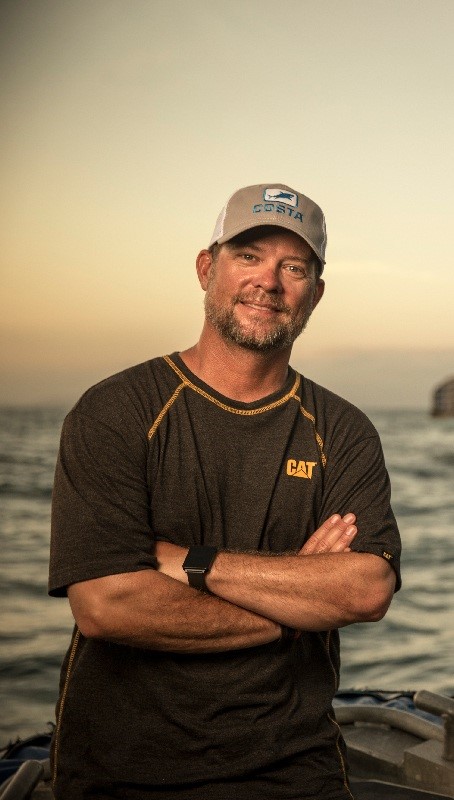
Q&A with Chris Fischer
Founding Chairman & Expedition Leader of OCEARCH
Principal Series:
Family Office Insights sits down with Founding Chairman and Expedition Leader Chris Fischer of OCEARCH, a recognized world leader in generating critical scientific data related to tracking and biological studies of keystone marine species such as great white sharks. Fischer, a visionary, ocean explorer, television personality and entrepreneur, shares with us in detail why he created OCEARCH and how he plans to create a legacy by pioneering free and real time access to the scientific data of keystone species.

Family Office Insights is a voluntary, “opt-in” collaborative peer-to-peer community of single family offices, qualified investors and institutional investors. Join the community here www.familyofficeinsights.com
Let’s start from the beginning. Tell us about your background and what peaked your interest in the ocean?
In 1997, I was working in our family business – as the sales manager for Asia – where we created the self-serve soda machine. We had built a nice business, but made the decision to sell it. At the time I was living in California. I developed an incredible passion for the water while chasing fish and frogs around the creeks and rivers of Kentucky growing up. While spending time on the water in California, my passion for the ocean grew and I realized that most people were disconnected from its beauty and challenges.
As a child I was inspired by Jacques Cousteau, so I set a goal to pour the world’s oceans into people’s lives at a scale unseen since Cousteau. I started a fishing show on ESPN called Offshore Adventures. It was the most watched fishing show of its time. I involved my wife and kids. We made the show about family and educated the public about ocean management while enjoying it in a sustainable manner.
While making the show, we brought scientists who studied what we were capturing and releasing, and gave them the capacity to advance their research. Many of the people who study fisheries and apex predators in the ocean lacked the basic capacity to capture, study, and release the very species they were researching. We traveled between Alaska and the Panama Canal making this show and helping the scientists; they all kept coming back to one thing: if we continue to lose the sharks in the ocean, there will be no fish left to eat or study.
What was the actual dilemma with the sharks?
The scientists showed us the numbers. We were losing 200,000 sharks a day, about 100 million a year to shark fin soup in Asia. Sharks are the lions of the ocean. If there are no sharks, there will be no fish. If you remove the sharks in the open ocean, squid numbers explode and they devour the bait and fish we depend on for food.
The scientists told us they didn’t have the fundamental data set needed to manage the ocean back to abundance. The sharks are so big that they had never been able to capture and study a live one, release it and track it to determine its full migratory range – where it mates, gives birth and the full range of their nursery. We decided to build an enterprise bringing professional mariners together with the science community to create the data required to manage our ocean’s keystone species back to abundance and thus the ocean toward abundance.
We had to solve this puzzle in a way that had never been done before—and at a rate that had never been achieved.
What happened in 2012? Why was it a game changer for you?
We decided to get EVERYONE involved in OCEARCH, not just those we touched through TV. We created the Global Shark Tracker so that anyone in the world could track our tagged sharks in real time. This was the first time that the public would be able to see the tracking data coming in at the same time as the PHDs leading the project. It might be the most charismatic ocean research project in the world at the moment and we wanted anyone interested to have the ability to get involved. Millions of people began tracking the sharks. Tracking was real time so we were delivering “Science in the now” at scale.
Then we asked: what if we open sourced content from the ship in real time? What if we focused on building our own system to make it happen? We decided we could open source content and build a digital press hub where members of the media (and everyone else) could not only grab access to the content, but also to the scientific data to see the movement of sharks tagged by OCEARCH and its collaborating scientists. It was “Exploration in the now.”
Tell us about the progress you’ve made thus far?
We’ve led 24 expeditions since 2007. It’s hard to believe that we set out to pursue a mark set by Cousteau just 9 years ago; he led 25 expeditions.
We’ve completed the expeditions, exploded science forward, are constantly collecting data and have over 50 research papers – either in progress or completed that will be leveraged for ocean policy.
We open sourced the tracking through our free Apps on the Apple and Android platforms and at www.OCEARCH.org. By creating the product and giving it away, we produced radical scale. School kids were following their favorite sharks; we had their focus so we leveraged that to drive STEM education. We created an open sourced NGSS STEM curriculum and integrated it into the real time tracking of the sharks. While kids track their sharks, they learn math and physics around a super compelling subject while developing into the data driven, centrist resource managers of the future. It was “Education in the now.”
Shortly thereafter, The Discovery Channel asked if they could have access to the curriculum. Today, the OCEARCH STEM Curriculum is available in 250 languages and disseminated to 30 million students per day.
Now instead of just making TV, it’s exploration, science, and education in the now communicated on free and open sourced platforms, supported by a network of social handles that allow people to consume content daily. Our scale has exploded and over 2 billion people a year are now involved in a centrist, data driven discussion about the ocean and its future.
By creating content and open sourcing science and giving it away in real time, we are delivering the ocean into people’s lives at a scale unseen since Cousteau.
What’s next? Let’s talk about fundraising.
OCEARCH has become bigger than any individual and it shouldn’t be limited to the capacity of any individual or die with anyone individual. We are trying to figure out how to set it up so that OCEARCH can have its own life. It takes is $2 million to pay off the ship (M/V OCEARCH - a 126' Cat powered vessel equipped with a 75,000 lb. hydraulic research platform) and with a $40 million endowment OCEARCH can be the world’s forever – to serve the science communities and future generations while open sourcing it all.
We need to aggregate the global tracking of all species in the ocean and on land to create a planet tracker. These dynamic data sets can then be integrated into educational programs. This will deliver the planet into people’s lives the way they consume content in today’s world at radical scale while creating awareness, ensuring the management of our planet toward sustainability.
We’re also working to design a boat, much smaller than the one we currently operate, that can be shipped around the world and donated to research communities to train their fishermen and build local capacity. All of this work would be open sourced in the now, creating a super dynamic environment shared with the world in real time.
How can people get involved?
We are hosting two expeditions that we’d like to invite members of Arthur’s network onto. One will be taking place in Long Island, NY from August 14-30th and one in Nantucket from September 18-30th. Help us fund our upcoming expeditions, pay off the ship loan, or build a $40M endowment. Help us find a foundation or institution that may want to be the home of OCEARCH in perpetuity. We want to continue to give our research away so that we can open source the ocean and plant at scale.

Chris Fischer
Chris Fischer has led 24 global expeditions, since 2007, to advance science and education, facilitating millions of dollars in collaborative ocean research on apex predators involving over 110 scientists from 59 regional and international institutions. Fischer’s goals are to enable scientists and governments around the world to generate groundbreaking, open-sourced data while enabling dynamic STEM education for school children. OCEARCH and Fischer have been mentioned in over 10,000 news stories since 2012. Fischer believes that being inclusive is inspiring. By breaking down institutional barriers and being resource-focused, scientists can obtain data at a rate otherwise not possible. Concurrently, students are being engaged with a K-8 STEM educational curriculum based on sharks and the Global Shark Tracker. This near real-time dynamic tool allows anyone to track and learn about sharks along with the brightest PhDs in the world. To watch a video with Family Office Insights founder Arthur Bavelas and Fischer, please click HERE. To learn more about OCEARCH, please visit the website, http://www.ocearch.org/.
